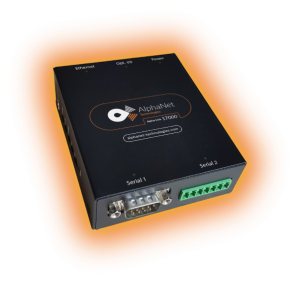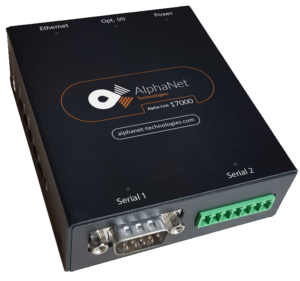In the dynamic landscape of industrial automation, the ability to extend and adapt communication protocols is paramount. The Modbus Gateway AlphaNet AT17000-MMt emerges as a versatile solution, offering protocol extensibility from Modbus RTU/ASCII to Modbus TCP. In this article, we’ll explore the significance of protocol extensibility, the role of the AT17000-MMt, and its impact on industrial connectivity.
The Importance of Protocol Extensibility
Adapting to Modern Industrial Needs
Industrial connectivity is a multifaceted challenge. It involves integrating diverse devices, systems, and protocols into a cohesive network. Protocol extensibility, the ability to bridge communication between different protocols, plays a pivotal role. Here’s why it matters:
- Legacy Devices: Many industrial systems still rely on legacy Modbus RTU/ASCII protocols. Protocol extensibility enables them to coexist with modern Modbus TCP-based networks.
- Interoperability: Different devices often use varying communication protocols. Protocol extensibility ensures that they can communicate and share data seamlessly.
- Scalability: As industrial networks grow and evolve, protocol extensibility allows for the addition of new devices without the need for a complete overhaul.
- Efficiency: Extending protocols reduces the complexity of network infrastructure, streamlining operations and reducing costs.
The Role of AlphaNet AT17000-MMt
Bridging the Protocol Gap
The Modbus Gateway AlphaNet AT17000-MMt is designed with protocol extensibility in mind. It serves as a bridge between Modbus RTU/ASCII devices and Modbus TCP networks, enabling seamless communication between the two protocols. Here’s how the AT17000-MMt fulfills this role:
1. Protocol Conversion
The AT17000-MMt acts as a protocol converter, translating Modbus RTU/ASCII commands and data into the Modbus TCP format. This allows Modbus RTU/ASCII devices to communicate effectively with Modbus TCP devices on the same network.
2. Real-Time Data Exchange
Industrial processes rely on real-time data. The AT17000-MMt ensures that data exchange occurs in real-time, providing timely information for decision-making and control.
3. Device Integration
Whether you have legacy Modbus RTU/ASCII devices or newer Modbus TCP devices, the AT17000-MMt seamlessly integrates them into your industrial network. This flexibility is invaluable for maintaining existing infrastructure while incorporating newer technology.
4. Remote Monitoring and Control
The AT17000-MMt enables remote monitoring and control of Modbus RTU/ASCII devices. This capability allows operators to troubleshoot, adjust, and optimize processes without being physically present at the device location.
5. Scalability
As your industrial network expands, the AT17000-MMt accommodates your scalability needs. You can add more Modbus RTU/ASCII devices or transition to additional Modbus TCP devices as your requirements evolve.
Key Benefits of Protocol Extensibility
Unlocking Opportunities
The protocol extensibility provided by the AT17000-MMt offers several key benefits to industrial operations:
1. Compatibility
The AT17000-MMt ensures compatibility between legacy Modbus RTU/ASCII devices and modern Modbus TCP networks, preserving existing investments in equipment.
2. Efficiency
By enabling efficient communication between different protocols, the AT17000-MMt streamlines industrial processes and reduces operational complexities.
3. Cost Savings
Protocol extensibility eliminates the need for costly hardware replacements or extensive network reconfigurations, saving both time and money.
4. Interoperability
Different devices with varying communication protocols can coexist and collaborate seamlessly within the same network, enhancing overall interoperability.
5. Future-Proofing
The ability to adapt and extend protocols future-proofs your industrial network, allowing it to evolve with technological advancements.
Real-Life Applications
Protocol Extensibility in Action
Let’s explore practical applications of protocol extensibility with the AT17000-MMt:
1. Manufacturing
In manufacturing, the AT17000-MMt enables the integration of legacy Modbus RTU/ASCII machinery and sensors into modern Modbus TCP-based control systems. This ensures efficient production lines and real-time monitoring of equipment performance.
2. Energy and Utilities
Energy grids and utility networks benefit from the AT17000-MMt by connecting legacy devices, such as substations and meters, to advanced Modbus TCP-based monitoring and control systems. This optimizes resource allocation and service reliability.
3. Transportation and Logistics
In the logistics sector, the AT17000-MMt facilitates the integration of IoT devices for real-time tracking and route optimization, ensuring efficient and cost-effective delivery operations.
4. Healthcare
Healthcare providers use the AT17000-MMt to connect medical devices and monitoring systems using Modbus RTU/ASCII protocols to electronic health record systems based on Modbus TCP. This integration improves patient care and data accessibility.
5. Agriculture
In agriculture, the AT17000-MMt supports precision farming by connecting Modbus RTU/ASCII sensors and automated machinery to Modbus TCP-based systems, optimizing crop yield and resource utilization.
Conclusion: Connectivity Evolution
Empowering Industrial Networks
The Modbus Gateway AlphaNet AT17000-MMt’s protocol extensibility capabilities are pivotal in shaping the future of industrial connectivity. By seamlessly bridging Modbus RTU/ASCII and Modbus TCP protocols, it empowers industries to optimize efficiency, reduce costs, and adapt to evolving technological landscapes.
As industries continue to embrace digital transformation and the Internet of Things (IoT), the AT17000-MMt remains at the forefront, enabling the convergence of legacy and modern communication protocols. It’s not just a gateway; it’s the key to unlocking the full potential of industrial networks.


